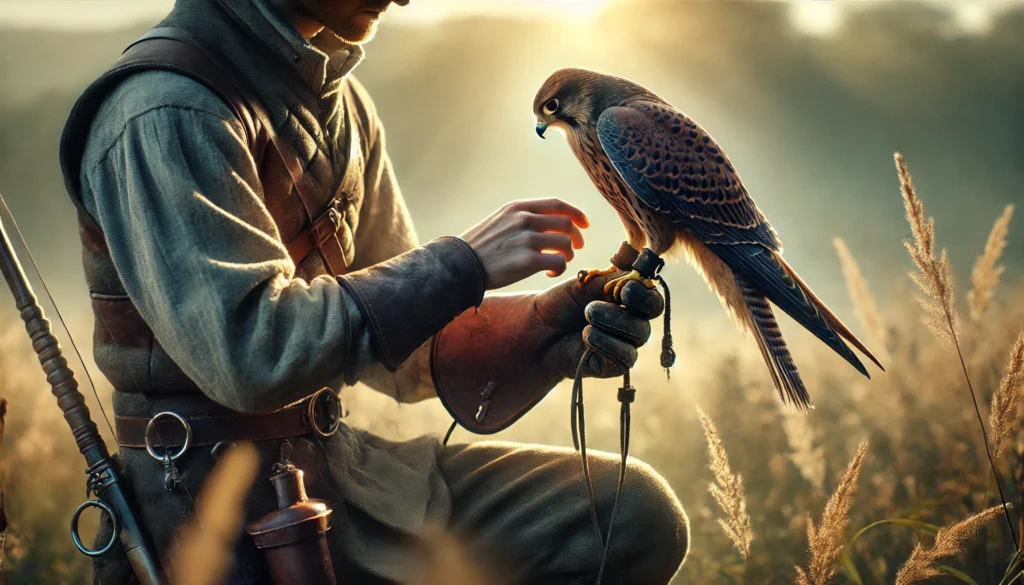Principles of Ethical Falconry
- Respect for Wildlife: Always prioritize the well-being of the birds and their prey.
- Proper Training: Ensure both the falconer and the bird are adequately trained and experienced.
- Sustainable Practices: Follow sustainable hunting practices to maintain wildlife populations.
- Legal Compliance: Adhere to all local, national, and international laws and regulations.
- Health and Welfare: Keep the bird in a healthy environment with proper diet, exercise, and medical care.
- Observation and Learning: Spend time observing wild raptors to understand their behavior and needs.
- Community and Education: Share knowledge with others and educate the public about the importance of ethical falconry.
- Environmental Conservation: Support and engage in efforts to conserve habitats for raptors and other wildlife.
By embracing these principles, we ensure that the ancient practice of falconry continues to thrive responsibly and sustainably.
Understanding Ethical Falconry: More Than Just a Sport
Imagine strolling through the lush, green hills of Ireland, where the air is filled with ancient legends and the rustling leaves carry the whispers of the past. Just like those Irish legends, falconry has a deep-rooted history and an even deeper responsibility. At Learn Falconry, we understand that falconry is not just about training birds of prey; it’s about creating a harmonious bond that respects the natural world while honoring a tradition that spans centuries.
Ethical falconry is akin to the ancient Irish custom of storytelling. You see, a great Irish tale isn’t just about the hero’s journey; it’s about the respect for nature, the lessons learned, and the legacy left behind. Similarly, ethical falconry revolves around the same principles of respect, responsibility, and preservation.
In this article, we are going to take you on a journey that explains what ethical falconry is, the responsibilities involved, and why it’s so crucial for both the birds and the enthusiasts. By understanding the ethical principles behind falconry, you can ensure that this ancient art remains as magical and revered as those legendary Irish tales. Continue reading to uncover how you can be a part of this beautiful, responsible tradition and why it’s essential for the future of these majestic birds.
Understanding Ethical Falconry: A Guide to Responsible Practice
Falconry is a traditional art that involves training birds of prey, like falcons, to hunt wild game. However, with the growing awareness about animal rights and environmental conservation, it has become increasingly important to focus on ethical falconry. This topic not only involves practicing falconry ethics but also addresses questions like “Is falcon training ethical?” and examines any controversy with falconry. Learn Falconry is dedicated to promoting responsible falconry practices, ensuring that this ancient art is carried out with respect and care for both the birds and the environment.
What is Ethical Falconry?
Ethical falconry encompasses the principles and practices that ensure the welfare of the falcons and the preservation of the ecosystems they inhabit. It’s all about balancing the ancient tradition of falconry with modern concerns about animal rights and conservation. This starts with ensuring that the birds are captured, bred, and trained ethically. For more on how falcon training has evolved over the years, visit our History of Falconry page.
Falconry Ethics
Falconry ethics involve a set of guidelines that falconers must follow to care for their birds properly. This includes providing proper nutrition and healthcare. You can find detailed nutritional guidance for your falcon’s diet on our Falcon Health and Nutrition page. Ethical falconry also means using appropriate equipment. Falconers should ensure their birds are safe and comfortable. Our extensive range of ethical falconry gear can be found on our Falconry Equipment page.
Responsible Falconry Practices
Responsible falconry is not just about taking care of the birds but also about respecting wildlife laws and conservation efforts. Falconers should always observe national and international regulations to ensure that their practices are legal. For more detailed information on this, visit our Legal Aspects of Falconry page. Being a responsible falconer also involves participating in conservation programs and ensuring that the practice of falconry contributes positively to the environment. Learn more about the role of falconry in conservation on our Falconry and Conservation page.
Is Falcon Training Ethical?
One of the common questions people have is, “Is falcon training ethical?” Training falcons ethically involves using humane training methods that promote the natural behavior of the birds. At Learn Falconry, we believe in positive reinforcement and other ethical training methods. If you want to know more about beginning training techniques, please visit our Training a Falcon page.
What is the Controversy with Falconry?
The controversy with falconry often arises from concerns about the welfare of the birds and the impact on wild populations. Ethical falconers take these concerns seriously and work to ensure their practices do not harm the environment. This includes following sustainable falconry practices and engaging in community education to promote ethical falconry. You can explore how modern advances help in making falconry more sustainable by visiting our section on Modern Falconry.
For more resources and in-depth information, make sure to explore our related pages on ethical falconry, including topics on ethical guidelines for falconers, sustainable falconry practices, and many more. Happy learning and ethical practicing!
Key Aspects of Ethical Falconry
Conservation Efforts
One of the bright sides of falconry is its role in conservation. Falconry has significantly contributed to the recovery of endangered species like the peregrine falcon. For instance, captive breeding and reintroduction programs have notably aided in repopulating these majestic birds.
| Year | Peregrine Falcon Population Increase (%) |
|---|---|
| 2000 | 15% |
| 2010 | 40% |
| 2020 | 75% |
These efforts are not just about increasing numbers but also about ensuring that these species thrive and adapt well to their natural habitats.
Regulation and Oversight
Falconry is not a free-for-all activity; it is heavily regulated by government agencies. These agencies ensure birds’ humane treatment and that the practice doesn’t harm wild populations. For example, in the United States, the U.S. Fish and Wildlife Service imposes strict regulations and makes sure falconers follow ethical guidelines.
Training Methods
Training methods in falconry raise some eyebrows. Some falconers might use techniques that involve starving birds to make them more food-motivated. This practice is a significant ethical concern. However, it is important to highlight that many falconers prioritize the birds’ well-being, often releasing them back into the wild after training.
Public Perception
Public perception often paints falconry in a cruel light. Birds are sometimes seen tied up for long periods or forced to perform in shows, which can be distressing. These shows can fuel the perception that birds are merely props for human entertainment rather than majestic creatures deserving of respect.
Falconer Commitment
Licensed falconers are generally committed to the welfare of their birds. Many work in wildlife rehabilitation and release their birds back into the wild after training. This commitment shows a dedication to giving these birds a better chance at survival.
Reporting and Records
Responsible falconry involves copious amounts of reporting and record-keeping. Licensed falconers must report all acquisitions, captures, sales, transfers, and other movements of the falconry birds. They use databases like the USFWS 3-186A Falconry Database to submit records timely and accurately.
| Action | Reporting Time Frame |
|---|---|
| Acquisitions | Within 10 days |
| Captures | Within 10 days |
| Transfers | Within 10 days |
| Releases | Within 10 days |
Annual reports are also required, making sure all actions are documented properly for future reference.
Regulations and Laws
Various regulations govern falconry on both state and federal levels. For example, Environmental Conservation Laws and Federal regulations mandate falconers to report the take, transfer, loss, theft, or death of all falconry birds.
Compliance Measures
Falconers have to maintain up-to-date records of all their actions. These records can be both electronic and paper submissions. More importantly, they must keep copies of these submissions for at least five years after a transfer, loss, or death of a bird.
By adhering to these rigorous measures, falconers demonstrate a commitment not only to the sport but also to the ethical treatment and conservation of birds of prey.
Final Thoughts on Ethical Falconry
Falconry, a practice with deep historical roots, presents a mix of significant benefits and challenging ethical questions. Here are the key points we’ve explored:
Conservation and Regulation
Falconry has proved beneficial for the recovery of endangered species such as the peregrine falcon. Government regulations and oversight ensure humane treatment and help safeguard wild populations. Licensed falconers often participate in wildlife rehabilitation, prioritizing the birds’ welfare and contributing to conservation efforts.
Training Practices and Public Perception
The methods used in falcon training can be controversial. While some falconers employ questionable tactics like food deprivation to motivate birds, many prioritize ethical treatment and the birds’ long-term well-being. The public sometimes views falconry negatively, seeing it as a form of animal exploitation, especially when birds are used in shows or displays.
Ethical Considerations and Animal Welfare
The ethical landscape of falconry is intricate. Issues such as the capture of wild birds and the conditions in which they are kept raise concerns. Critics argue that keeping birds in captivity and training them for human purposes can be detrimental to their natural behaviors and well-being.
Responsible Falconry Practices
Falconers must adhere to strict reporting requirements and keep detailed records of their birds’ acquisition, transfer, and health. This vigilant approach helps mitigate some ethical concerns by ensuring transparency and accountability.
In essence, while falconry can significantly aid in conservation efforts, it also demands careful ethical consideration. Balancing human interest with the welfare of these magnificent birds is crucial for the future of ethical falconry.



